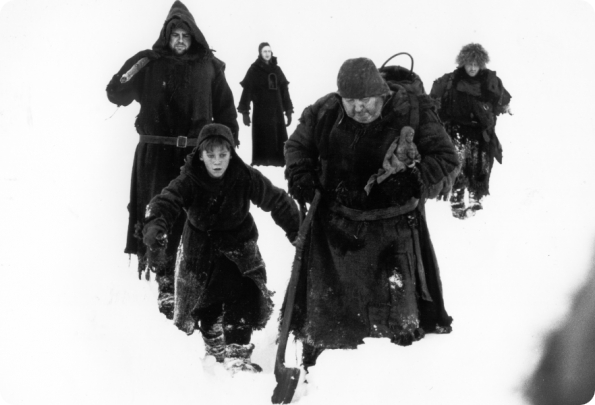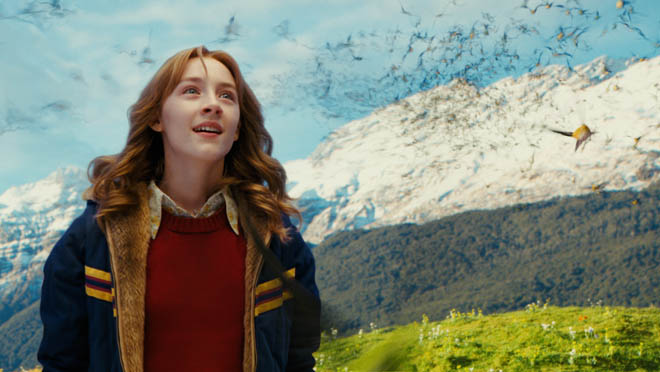“In the mid-14th century one third of Europe’s population succumbed to a new disease. The shadow which advanced across Europe into England was known as the Black Death.” The intertitle cuts to nine-year-old Griffin in the grips of a vision: the moon, a lighted torch tumbling through a shaft, a battering ram, a water passage, a glowing church spire, bare hand over gauntleted hand moving up ladder rungs, a Celtic cross, a coffin pushed to sea. Then a snowball breaks the trance. Thus begins New Zealand director Vincent Ward’s 1988 The Navigator: A Medieval Odyssey.
Griffin’s remote Cumbrian mining village rejoices when his older brother, Connor, returns from his travels, but their welcome darkens when he confirms rumors of the reach of a Black Death plaguing Earth. “One lump under your arm at breakfast,” they’ve heard, “and you’re dead by noon.” They weigh the danger, and consider making an offering to spare the village, but that would mean a journey. None but Connor has ever been outside the village, and Griffin has begged him never to leave again.
Yet as they beat boats of refugees from their shores and weigh their options, a journey to a great church that has been built in the West, “the highest in Christendom,” becomes their only hope. “An offering,” says Martin, one of the miners. “We’ve got to take the offering, Connor. To the great church. To the far side of the Earth.” They have only until sunrise, Connor tells them, before the plague will descend upon them “like a sack.” Griffin falls and his vision returns: the torch, the shaft, the battering ram, the cross. The fragments of the dream coalesce into the commandments of a quest. “Your head in the clouds again, Griffin,” scoffs another miner, Searle, but Connor’s wife Linnet admonishes, “Leave him. He’s been right before.” “It’s our only chance,” Connor assures them, “and Griffin comes, too” for his dreams’ full revelation has yet to accrue.
Headed by the confident Connor, the band of volunteers, like Chaucer’s pilgrims, is representative: Searle is the cautious one; Searle’s brother Ulf, the naïf; Martin is sanguine and steadfast; and Arno has lost a hand to thieving. The miners gather the copper ore they will need to cast the cross to raise upon the celestial city’s church spire, and, indeed, they come upon the shaft, just as in Griffin’s dream where – miraculously – there is a battering ram by which they will burrow through Earth’s core.
Structured in three acts, the preparation and the journey comprise Act One; negotiating the strange new world on Earth’s far side, Act Two; and the denouement returned to the Cumbrian village, Act Three. Their medieval world is a bleak black and white punctuated by Griffin’s dreamscapes. Act Two finds our traveler’s arrived in a sewer, one by one, climbing the ladder out onto a knoll above a nightscape of color in contemporary Christchurch, New Zealand. “Think how much tallow,” Martin thoughtfully observes, “you’d need for all that light?” “That’s the city,” Griffin exclaims. “The one I’ve been seeing in my dreams.”
Connor gives them their charge: find a foundry. “All you have to do is follow your nose. Even in big cities you can smell a foundry. Gauge wind. Steer a course.” Once separated, each pilgrim must confront his own trials. Flummoxed by freeways and high speed trains, lost amidst labyrinthine nighttime streets, threatened by a submarine leviathan, and yet somehow they serendipitously come across what they need and know: a horse, a boat, and at the center of the time-traveling tale, a foundry that has closed its final day of operation. The laid-off workers, commiserating one last time, hardly look askance when this ragtag bunch in coarse wool tunics and skullcaps appears. “We brought copper,” Searle explains. “Cast a spike,” Griffin begs, “or the village is lost.”
The magic of the foundry sequence derives from the timelessness of the technology. The medieval villagers are miners and iron workers, and their knowledge is commensurate with the contemporary foundrymen. Together they smelt the ore and cast the cross. For me, this collaborative act of creation, more so even than the numinous suspense of the film’s latter half, is testament to the argument for the redemptive power of art.
Released in 1987 against the backdrop of the AIDs epidemic, The Navigator’s time traveling pilgrims recall Ingmar Bergman’s medieval wanderers in The Seventh Seal (1957) and Antonius Block, the knight who tries to forestall Death with his game of chess, just as the Cumbrian miners hope to spare their village through the oblation of the cross. The casting of the cross also echoes another film important to Ward, Andrei Tarkovsky’s 1966 Andrei Rublev, which chronicles the 15th century itinerant icon painter, and concludes with the casting of a huge copper bell for the Grand Prince. The bellmaker and his family have all died of plague, save for his son, who knows failure to create a bell that rings will get them all beheaded.
Whereas The Seventh Seal plays out over a number of days, even weeks, and Andrei Rublev follows the icon painter over the course of almost a quarter century, Ward has placed his tale within Aristotle’s three unities. The narrative’s unity of action is the goal to cast and raise the cross. The parameters of the quest require the action take place before daybreak, fulfilling the unity of time. But what of the unity of place? In its antipodean geography – 1348 Cumbrian England on the one hand, 1988 Christchurch, New Zealand on the other – we are set on two sides of the same geographic coin. We might similarly view the juxtaposed 14th and 20th centuries as reflections, each of the other, of the universality of the human condition.
The pilgrims’ quest is an existential journey. They overcome the obstacles to its realization, not out of a mere instinct for self-preservation but for the survival of the community to which they owe a shared responsibility. The actions they undertake – in the face of mortality and the absurd – imbue their lives, and by extension the life of the village, with meaning. Andrei Rublev, having forsaken both icon painting and speech for a dozen years, breaks his silence to comfort the terrified yet relieved sobbing son of the bellmaker. “You’ll cast bells. I’ll paint icons.” Vincent Ward’s Cumbrian peasants will mine and cast copper. It is not simply the making that renders meaning, but creation in service to something larger than oneself. In his production notes Ward says that “Navigator is essentially about an act of faith – people believing they can change the course of their life. …. I believe faith and hope are prerequisites for action and change, regardless of the odds.” Indeed, in its final act The Navigator insists, all sacraments are undertaken as acts of faith and communion.



